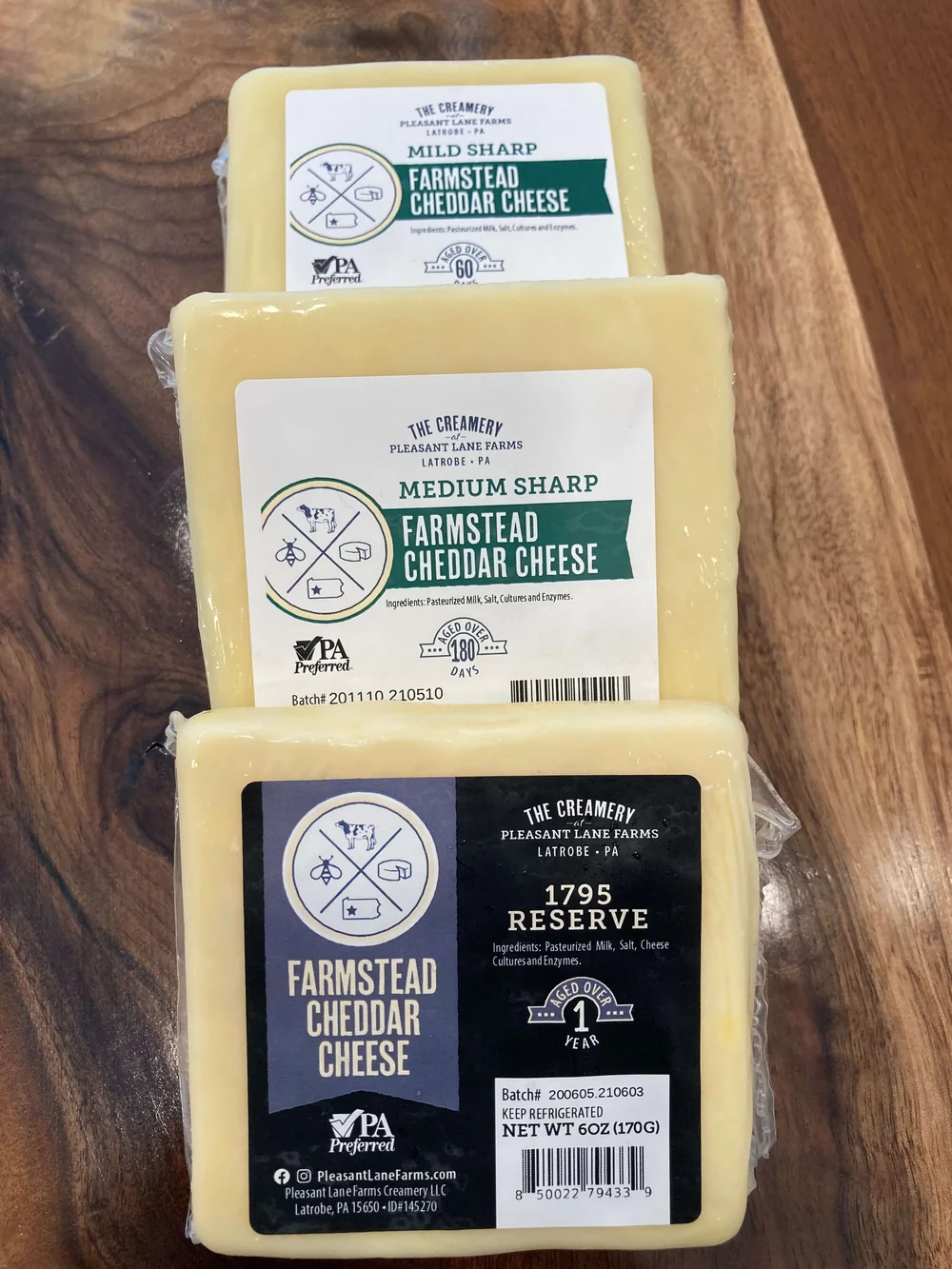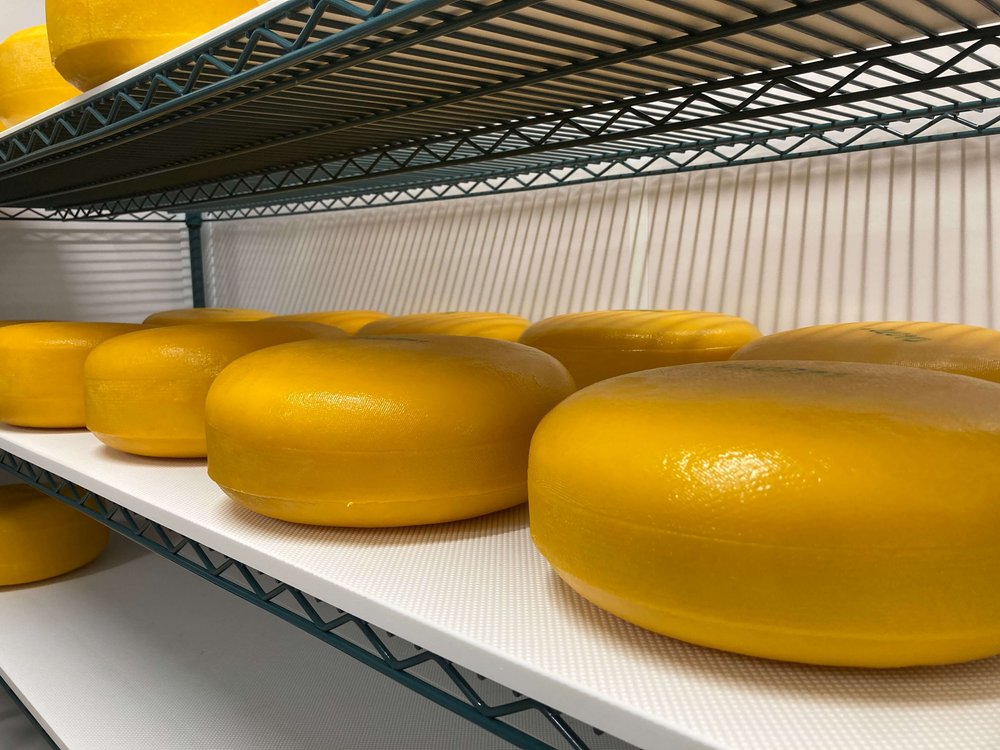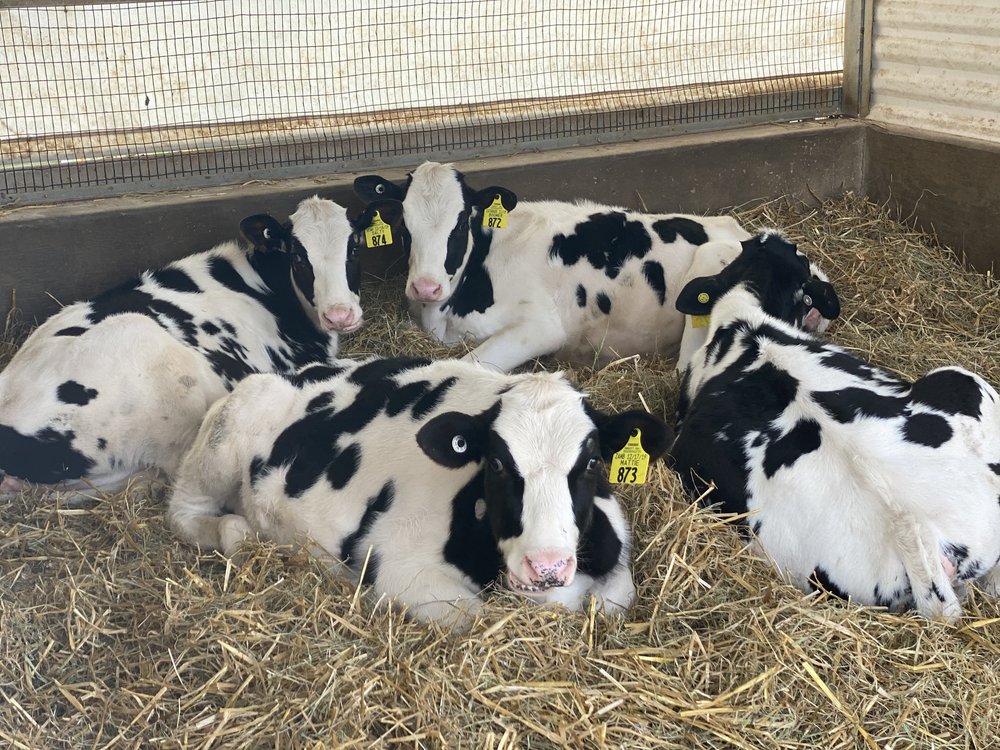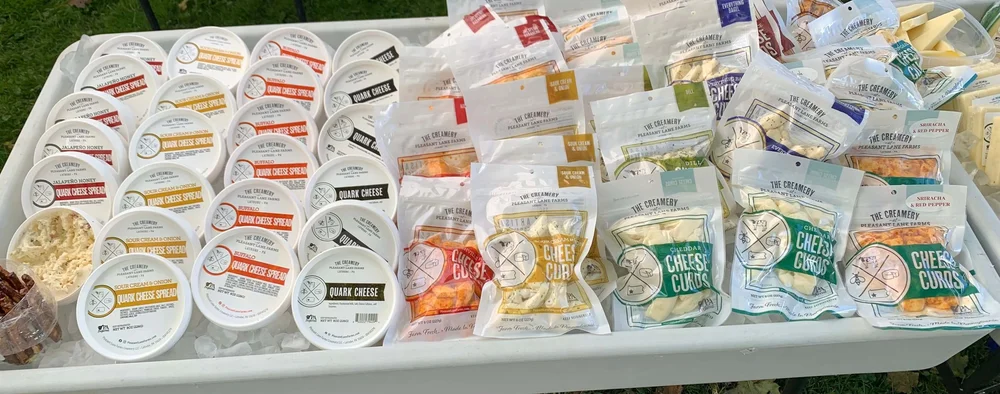
Jason Frye and his brothers had to make a choice about the family farm, Pleasant Lane Farms. Their family had been in the dairy business in Pennsylvania since 1795, thanks to an original Revolutionary War grant. Their parents, Marine Corps veteran Ralph Frye Jr. and his wife Ann, leased the current property in 1976 and later purchased it for their dairy. But in the 2010s, the Frye siblings faced three choices: keep it as a small farm, sell the property, or they could make cheese, “so that the next seven generations would have something that they could reach back to as part of their heritage,” Frye said.
Seeing a Future in Cheese
Cheese won out. Frye left his job as Chief Technology Officer at a software company and his brother Todd retired as a recruiter for the Army National Guard to establish the Creamery of Pleasant Lane Farms. They got some grant money from the Pennsylvania Department of Agriculture that helped purchase the cheese-making equipment.
They began construction for cheesemaking in 2019 and made their first batch of cheese in April 2020. “No good business plan survives contact with anything,” Frye explained. While they were working to get the local market, like restaurants and retailers, interested in their future product, the rumblings of COVID-19 were running through the industry, which made folks hesitant.
Aging Cheese photo courtesy of Pleasant Lane 
When COVID shutdowns hit, the company was fortunate enough to get an emergency exception for inspections and certifications from the state so they could sell cheese. But shutdowns meant that Neville McNaughton, also known as Dr. Cheese, had to mentor them in the creamery via Zoom, instead of in-person. (Originally hailing from New Zealand, McNaughton has worked as a cheese consultant for CheezSorce, helping cheesemakers across the United States and the world.) “Looking back on it a little bit comical. We didn’t know what we didn’t know,” Frye recalled. There was the challenge of communicating the look, feel, taste and smell to Dr. Cheese virtually as they learned to make cheese.
When they had their first batch of cheese to sell, they announced it on their social media. Frye said, “Next thing we know we had cars lined up, ready to buy cheese from us.” That was how they operated for a few months before restrictions were lifted and they sold at the farmer’s market and local retailers. They started with short aged cheese, like cheddar cheese curds and a spreadable cheese called Quark which won both the Silver Medal and Quark Cheese Creamery of the Year at the 2022 NY International Cheese Competition. In 2021, they received a second grant to purchase a second vat to make cheese, doubling their output. They also built a Smart Barn, leveraging robotic technologies for cheesemaking.
Better Starts Here
Better starts here is the tagline for Pleasant Lane Farm. Does Frye’s background in software impact the way he makes cheese? Frye admits it does. “A cheese recipe is like a program,” he explains, adding that one of the great things about working with McNaughton was his evidence-based approach to helping them design their cheese recipes. That complemented Frye’s background in technology and general science, he’d always question why tweaks in technique were made. “The answer is not going to be that it’s a better product. That’s the outcome. The why, for me, is what’s the biochemical process.”
Cows photo courtesy of Pleasant Lane
That methodical approach is taken at all levels of the creamery. Frye explained, “We actually think about what we are planting for the cows to eat. What types of grasses, grains, and corn are we cultivating?” They know the DNA of their entire herd. “We look for certain milk protein markers that research has shown to do two things. One, they have a better [milk] yield. Two, they make a better tasty, more digestible cheese,” Frye noted. Some customers have said that they can eat Pleasant Lane’s cheeses, but not other cheeses from other farms.
Even the milk is measured and observed before it even goes into the milk tank. They can check the quality and if it is not up to standard, it gets diverted elsewhere. “Because with a small herd, we’re milking 56 cows, you can’t blend your way to good,” Frye said.
Getting Creative with Curds
Curds and Quark photo courtesy of Pleasant Lane 
Many people know their many flavors of cheese curds, everything from jalapeño habanero to Moroccan flavored curds. But that was the result of chance and circumstance. Frye remembered that when they made their first batch of cheese, they had 200-300 lbs. of cheese curds that they were going to package in 8 and 16 oz bags. One of their partners, Craig Deule, said he really liked ranch, so they decided to make some ranch flavored cheese curds. And people loved it and asked for more flavors. “Those cheese curd flavors filled in for our customers and the early days when we didn’t have other products,” explained Frye.
Then they took it a step further and the creamery reached out to companies that sell seasoning about the hottest trends in flavors. They’d get samples and try them on the cheese curds. Now, they have tons of flavors; some are constantly available while others are seasonal. Frye noted about pastrami spiced cheese curds: “You would swear if you closed your eyes that you’re eating a piece of pastrami from a New York deli.”
Building a Legacy with Cheese
Early on, they decided that Pleasant Lane Farms would be “a mid-premium brand for the Greater Pittsburgh region,” Frye said, at premium grocery stores like Whole Foods or Giant Eagle Markets. They wanted to be in many cheese shops in the area, as well as local restaurants.

But they also wanted to have one to three products that “we could put a halo around as a nationally sought after product,” Frye said. But it takes time. They’ve worked on creating that halo for two of their cheeses, one year aged 1795 Reserve Farmstead Cheddar Cheese and Gouda 1976 Reserve – Aged 1 Year. Cheddar is named after the founding of the original family farm in 1795 and it won the Bronze Medal at the 2022 NY International Cheese Competition. The Gouda is named for the recent founding of the farm by Frye’s parents; it is also award-winning. However, they prioritize their local market, promising products to the local grocery stores first, but he hopes that they’ll be able to expand even more in the upcoming year to supply the national market. Some cheeses are more perishable, like their award winning Quark cheese, but they plan on shipping it out later this year. Their other cheeses can be shipped across the country, like their many seasoned cheese curds.
They are starting to see restaurants adding their cheeses to their menus, whether in cheese plates or within dishes. Frye noted that one restaurant group in Pittsburgh has been using their 1795 Cheddar Cheese for a super high end mac n’ cheese. Their spreadable cheese, Quark, is being used in desserts and pasta recipes at other places. Local pizzerias are using their Mediterranean Style Pizza Cheese. “We’re really excited about the restaurant side of it growing for us,” Frye said, “it’s one restaurant group at a time.”
For Frye and company, there is a lot of pride in their work as a small family operation (though they do have non-family members working there too). “Every time somebody buys our cheese, it’s really supporting our vision of the next generations being able to have this business for them to do with as they please,” Frye said. He hopes that someday his kids or grandkids will name a cheese in honor of the founding of the creamery in 2020 just as he and his family honored their family history with their signature cheeses.
